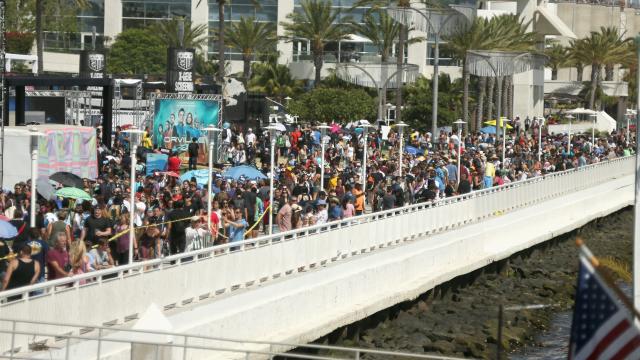At this point, you know what the deal is regarding the coronavirus pandemic and comic book conventions in the U.S. Because the virus is most easily transmitted between people when they’re clustered into enclosed spaces and when they’re in large groups, cons of all types have been put on hold for the year.
While there isn’t going to be a traditional Comic-Con in San Diego this winter, the convention’s organisers have been working to coordinate a digital equivalent that people can participate in from the comfort and safety of their homes.
It’s unclear just what exactly Comic-Con@Home is going to look like or how it’s going to function, but in a recent interview with the Hollywood Reporter, Comic-Con International spokesperson David Glanzer expressed that the digital con isn’t meant to be seen as the new normal for the event.
“I don’t think we’ve really thought of it in terms of a replacement for the show,” Glanzer said. “It is an iteration that we hope will convey some of the excitement of Comic-Con in whatever format we and our stakeholders can create. We are reaching out to various entities who are usually involved in the physical show to see if, and how best, we can incorporate them into an online version.”
Glanzer continued by emphasising that Comic-Con@Home isn’t something. that organisers ever foresaw having to put together, let alone so close to the projected date for this year’s SDCC, and he also expressed that there are many elements to the digital convention that have yet to be fully hammered out.
It is very, very good that SDCC’s organisers both took to heart just how serious the global pandemic is and also made an effort to pull people into the event mindspace that they’d intended to be in while physically perusing artist alley (which currently has no virtual component) or waiting in line to watch a trailer for the first time. But Comic-Con@Home’s existence begs the question as to what exactly comic book conventions are going to look like in the future—because as it currently stands, there’s no foreseeable future in which covid-19 completely stops being a threat.
So much of the Comic-Con experience revolves around people being witness to the new developments coming out of film studios and comic books publishers that a convention without those things wouldn’t really feel like Comic-Con. Comic-Con@Home might just be a one-off thing that’s meant to feed nerds’ hunger for genre news for a few months, but there’s a more than real possibility that measures like these are going to have to become the new normal for conventions.
With that being the case, the question that comes to mind is just how this would all work. Putting content behind digital paywalls in place of badges is easy enough, sure, but in order to create an experience comparable to the normal Comic-Con, the event would need the group participation of dozens of studios and publishers who could easily just hold their own events where they were the singular focus.
The challenge SDCC’s facing right now is making the case for its existence. These times aren’t just trying in the existential sense, they’re trying in the practical sense and forcing multiple industries to revaluate how they function on a basic level. Dear as Comic-Con is to people, one hopes that the organisers figure out a way to weather this storm, but devastating as this pandemic has been, it’s unclear whether that’ll be possible.
